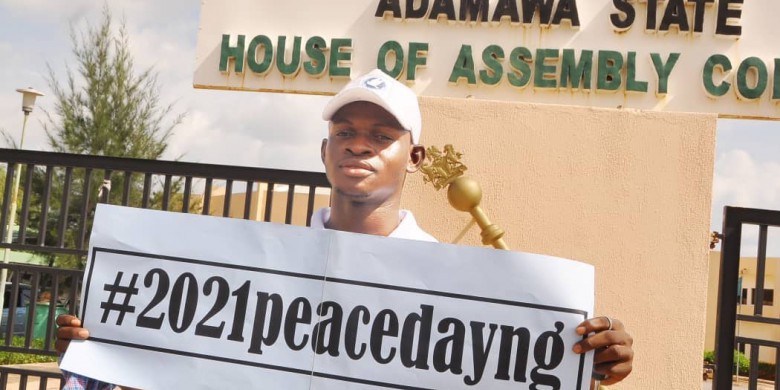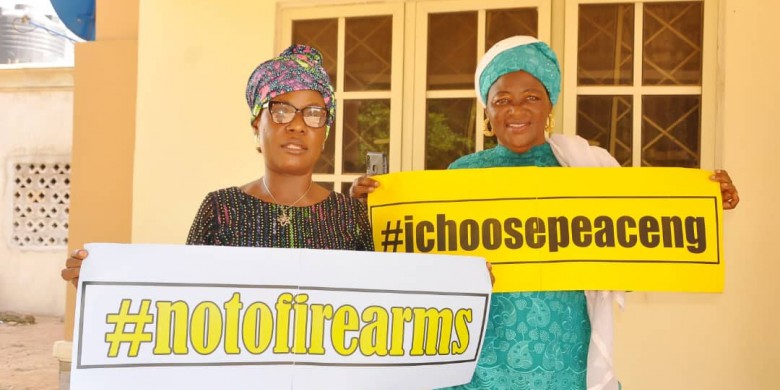
‘Peace is not an add-on; Peace is the way’
“Local Voices at a Crossroads” is an article series in which local actors of everyday peace share their insights into the fragilities and resilience of their societies in the face of conflict. Grassroots societies lie at the crossroads between local realities and national peacebuilding policies and practices. The series therefore aims to accelerate action at the local level by strengthening the voices of civil society at the policy level. “Local Voices at a Crossroads” is hosted by the Civil Society Platform for Peacebuilding and Statebuilding (CSPPS) and is the result of a collaboration with the Peace and Conflict Resolution Evidence Platform (PeaceRep) at the University of Edinburgh.
In this episode of “Local Voices at the Crossroads’, we look at the work of the Centre for Sustainable Development and Education in Africa (CSDEA) and its efforts to advance an inclusive and participatory multi-stakeholder approach to building peaceful and resilient communities. As the focal point organisation of CSPPS in Nigeria, CSDEA is represented by Mr. Theophilus Ekpon, CSDEA Executive Director. Mr. Ekpon shared his on-the-ground perspective of the local and national efforts undertaken by CSOs to include civil society in decision-making processes and for stakeholders to achieve, together, sustainable development and peace.
CSDEA’s efforts in addressing Nigeria’s multifaceted challenges
The persistent oil resource problem in the Niger Delta region, violent extremism in the North East, and kidnapping and banditry across the country are just a few of the crises threatening Nigeria's peace and security. These factors have been exacerbated by the outbreak of the COVID-19 pandemic, which has demonstrated the fragility of the country’s institutions and the need for unified action in the face of the growing challenges. Like in many countries, the outbreak of COVID-19 in Nigeria has caused widespread misinformation, both on the sanitary crisis itself and on the socio-economic difficulties it has engendered or aggravated (such as shortfalls in revenues, increases in gender-based violence, and shrinking civic space).
CSDEA's mission in responding to this context is to propose and promote innovative and creative ideas to ensure Africa's sustainable development. Through advocacy, capacity development, reflective dialogue, and research, CSDEA promotes transformative policies that contribute to peacebuilding, environmental sustainability, and good governance. CSDEA takes a multi-stakeholder approach, networking with groups on a local, sub-regional, continental, and global level that share similar values.
CSDEA's efforts to raise awareness about the pandemic and its effects have been numerous, including the development of messages broadcasted on radio talk shows reaching over 50 million Nigerians, as well as advocacy activities directed at the Nigerian government to demand civil society participation in national pandemic response programs. Furthermore, in a series of four articles published in national newspapers and reaching 20 million Nigerians, CSDEA reflected on the impacts of COVID-19 on the implementation of SDG16+.
These activities are in line with CSPPS’ core objectives of strengthening and broadening civil society participation and inclusion in peacebuilding, statebuilding, and crisis prevention, as well as influencing development policies with peacebuilding principles. It also works in conjunction with the International Dialogue on Peacebuilding and Statebuilding (IDPS) and the New Deal principles - a key agreement between fragile and conflict-affected states, international development partners, and civil society to improve current development policy and practice - to which CSPPS is part.
Let us see what Peace can do
CSDEA engages on a regular basis with stakeholders and organisations at all levels. Joining hands and raising common voices to face today’s challenges is the only way to overcome them and achieve the goals of the 2030 Agenda, and CSDEA knows it.
A good example of such effort is CSDEA being a signatory of a shared statement by peacebuilding organisations aiming to promote the vision of a global partnership to transform the world and achieve the 2030 Agenda for Sustainable Development. It was shared on this year’s International Day of Peace, 21 September 2021, a day declared by the United Nations General Assembly to be devoted to strengthening the ideals of peace, both within and among all nations and peoples. This comes in hand to further pressure the Nigerian government to collaborate with civil society and international actors in a sustainable manner when tackling challenges faced, especially when the COVID-19 pandemic broke out.
The statement “Let us see what peace can do” focuses on four main areas: Refocus on peace, justice, and inclusion, in development, in crisis response and in addressing the climate emergency; mainstream and step up investments in peace; prioritize inclusion and protect human rights and fundamental freedoms; step away from securitized responses.

On that same day, CSDEA’s team in Yola, Adamawa State, North-East Nigeria, organised a peace rally to commemorate the International Day of Peace, and address these longstanding threats to peace and security to and with civil society. This celebration was led by the Institute for Peace and Conflict Resolution (IPCR) under the International Peace Day Committee with the aim to create awareness on how to maintain peace and bring the issues of sustainable peace and non-violence to the national level. Such awareness is particularly needed in North East Nigeria, suffering not only strong internal struggles, but ones that expand to the whole region of West Africa and the Sahel. Those comprise the multiple security crises Nigeria faces, including the presence of the Boko Haram insurgency, the clashes between herders and farmers, the kidnapping crisis, and police violence.
This celebration helped doing so, by mobilizing citizens in the streets and in front of the House of Assembly - the legislative arm of the government of Adamawa State -holding banners with hashtags #notofirearms and #Ichosepeace. Captured by the media, the celebration allowed the citizens in North East Nigeria to see the need for devotion and unity if sustainable peace is to be achieved. CSDEA was received by members of the House of Assembly to present their case on sustainable peace and non-violence in the North East, and to start designing legislation targeting those.

So far, the celebration was well taken and appreciated by both the citizens and members of the House of Assembly.
“Thus far, we have received positive feedback on the initiative and we hope that it will help leading us to the design of a legislation on sustainable peace and non-violence” Mr. Theophilus Ekpon, Executive Director of CSDEA
Nigerian Action Plan on Youth, Peace & Security
In its efforts to work in line with the IDPS and the New Deal, CSDEA has been working towards an implementation of the United Nations Security Council Resolution (UNSCR) 2250 on Youth, Peace, and Security (YPS), a resolution adopted by the United Nations Security Council on 9 December 2015 which recognizes that young people play an important and positive role in the maintenance and promotion of international peace and security.
Addressing the youth agenda and including young Nigerians in peacebuilding processes is part of CSDEA’s multi-stakeholder approach to achieve sustainable peace and development. CSDEA engages with youth on a regular basis, through advocacy and capacity-development to train them on peace and human rights and encourage them to become peace ambassadors in their communities.
On November 12021, Nigeria became the first country in Africa to adopt a National Action Plan (NAP) on the UNSCR 2250 on YPS. It was launched in the capital city of Abuja during the three-day long National Youth Conference, to bring attention to and address the peace and security challenges of youth. Up to this point, the Nigerian youth had not been empowered enough to actively participate in the policymaking of peacebuilding processes. The YPS NAP is an attempt to do so through the domestication of UNSCR 2250.
The National Youth Conference saw over 500 participants, including the Minister of Youth and Sports Development Mr Sunday Dare, the Minister of Women Affairs Mrs Pauline Tallen, the Vice President of Nigeria Professor Yemi Osibanjo, representatives of the United Nations Population Fund (UNFPA) and the European Union (EU), civil society organisations, and youth groups. This not only shows the commitment of the Government of Nigeria to give attention to the YPS Agenda but also promotes a multi-stakeholder approach to the subject.
Since 2016, a large variety of stakeholders across the country have collaborated on developing the YPS NAP, designed to complement existing policy initiatives while reinforcing Nigeria’s commitment to ensure the meaningful engagement of youth in conflict prevention and peacebuilding efforts. The document, which you can download via this link, is a practical guide to Federal, State and Local Governments, as well as non-governmental stakeholders, aiming to ensure that their programmes respond to the immediate and long-term needs of youth. It was developed in tandem with the five pillars of the UNSCR 2250 which includes Participation, Prevention, Protection, Partnerships, as well as Disengagement and Reintegration.
CSPPS has been involved in this process via CSDEA which has been coordinating efforts in bringing a coalition - composed of over 100 organisations and is still growing - together that has spearheaded the drafting of this NAP, in addition to having provided both technical as well as financial support to the development of the YPS NAP initiative.
As a result of the YPS NAP, CSDEA is currently trying to set up youth centers in all six geopolitical zones of Nigeria. These centers aim to bring young people together, encourage dialogue, provide them with training, and allow them to not only recognize conflicts arising among their peers but to mediate them peacefully. These are all necessary instruments to create an inclusive and peaceful setting where young people can grow and be the leaders of tomorrow.
These initiatives are only an example of CSDEA’s continuous work in promoting the inclusion and participation of all stakeholders in peacebuilding processes in Nigeria. Global partnership is a must to recover from the pandemic and rebuild better. Peace is not an add-on; peace is the way to achieve Agenda 2030 and live in peaceful, just and inclusive societies.
If you would like to learn more about their activities, please contact CSDEA at info@csdea-africa.org
